Fight for an Anti-War Government
• Oppose U.S. War Crimes in Iraq and Yemen
• Connect the Movements Around the Women's March, the Day Without Immigrants to Anti-imperialist/Anti-militarist Actions • U.S. Begins Ground Invasion of Syria
Organize Anti-War Alternatives
Oppose U.S. War Crimes in Iraq and Yemen
It is estimated that at least 300 people, most if not all civilians, were killed in U.S. air strikes on the Iraqi city of Mosul in March, the 14th anniversary of the illegal U.S. invasion. It is likely many more civilians were killed, as the U.S. increases its bombings in the area, terrorizing the population in the name of “saving” them from terrorists. The bombings have also forced more than 180,000 people, mostly families, to flee the area and join the many hundreds of thousands of refugees the U.S. aggressive war has created. The years of war have solved no problem while imposing massive death, destruction and chaos.
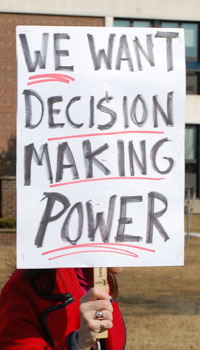 These most recent war crimes, like the unjust war itself, are to be condemned and punished. Yet even though the majority of people in the U.S. oppose the war in Iraq and all the many crimes, there is no constitutional means to hold the government war criminals to account. There are no means to charge or even sue the criminals. This is a serious problem that requires sober deliberation. How is it that such a grave matter as war crimes and punishment for them is not part of the constitution? What content is required in a new constitution so as to ensure the crimes and criminals can be identified and punishment rendered and the demand of the people for peace ensured? Addressing such matters is an important part of the work today for an anti-war government.
These most recent war crimes, like the unjust war itself, are to be condemned and punished. Yet even though the majority of people in the U.S. oppose the war in Iraq and all the many crimes, there is no constitutional means to hold the government war criminals to account. There are no means to charge or even sue the criminals. This is a serious problem that requires sober deliberation. How is it that such a grave matter as war crimes and punishment for them is not part of the constitution? What content is required in a new constitution so as to ensure the crimes and criminals can be identified and punishment rendered and the demand of the people for peace ensured? Addressing such matters is an important part of the work today for an anti-war government.
The U.S. has also stepped up its attacks in Yemen, a country that is no threat and whose people have long opposed U.S. intervention. U.S. forces carried out a barrage of 30 airstrikes in 36 hours, exceeding the 32 confirmed U.S. drone strikes in Yemen in all of 2016. Over the past two years the U.S-backed Saudi Arabian airstrikes have killed thousands of civilians, with more than 1/3 of the strikes hitting civilians. As well, conditions imposed by the U.S. sponsored war against Yemen have imposed starvation for many across the country. Again, no problem has been solved, conditions for the peoples have worsened, and death, destruction and chaos are widespread. Putting a stop to U.S. terrorism against the peoples is required, first and foremost by bringing All U.S. Troops Home Now!
Despite the reality that more troops and more bombings have not won any U.S. wars, whether against Korea, or Vietnam, or now Iraq, Afghanistan, Syria and Yemen, this is the only answer the U.S. provides. It is desperate to hold onto and expand its world empire and sees force and more force as the only response.
The increased aggression in both Iraq and Yemen are indicators that the government is planning for yet broader war. Trump has called for increasing the number of just Army troops from 475,000 to about 540,000. This means recruitment in the high schools and universities will be stepped up, with potential for a draft in the future. A key stand against such militarization in the schools are organizing efforts to provide an anti-war alternative. Youth are the ones forced to be soldiers in the U.S. imperialist army, with African Americans and Puerto Ricans a main target of recruiters. Now is the time to counter recruiters and organize anti-war youth committees, to defend our rights and our communities from war and repression.
[TOP]
Connect the Movements Around the Women's March, the Day Without Immigrants to
Anti-imperialist/Anti-militarist Actions
Students ask , "How much is the military like 'Call of Duty,'" (a popular first-person shooter game). I'll say, "Do you hear babies and moms crying when they watch people die in front of them, innocent people die in front of them?" "No, not really" is their answer. "Are the majority of the people you kill in 'Call of Duty' innocent?" "No, not really." "Is there torture in 'Call of Duty'?" "No, not really." "Can you turn off 'Call of Duty'?" "Yes." "Well, you can't really turn off war after you have been there."
Below is an interview with Rory Fanning, a veteran and conscientious objector, and author of the book Worth Fighting For: An Army Ranger's Journey Out of the Military and Across America. His work centers on opposing U.S. militarism at home. He is also the coauthor, with Craig Hodges, of the new book Long Shot: The Triumphs and Struggles of an NBA Freedom Fighter. He lives in Chicago, and often speaks at high schools there. He said, "There are more kids signed up in Chicago’s JROTC (Army) and NJROTC (Navy) than any other school district in the country; ten thousand kids: 50 percent Latino and 45 percent Black." Speaking about Trump’s proposed budget he said:
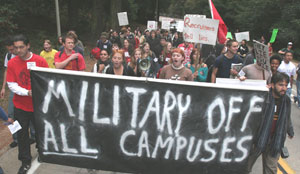 Rory Fanning: I think it is important first to note that this request by this budget, particularly through defense, is not unprecedented. It really only takes us back to 2011 numbers when they kind of set a cap on military spending. But Obama asked for $700 billion for defense in 2012. I think Trump is asking for $600 billion, which is an increase of $56 billion over the previous year. It is still more military spending than the next thirteen countries combined. One of the most alarming things about this budget is the number of active-duty Army troops that are going to be increased. It is going to go from 475,000 to about 540,000 at a time when there is really no existential threat to the United States. It is ridiculous. I think that is just going to mean more intense recruiting in the most vulnerable communities in the U.S.
Rory Fanning: I think it is important first to note that this request by this budget, particularly through defense, is not unprecedented. It really only takes us back to 2011 numbers when they kind of set a cap on military spending. But Obama asked for $700 billion for defense in 2012. I think Trump is asking for $600 billion, which is an increase of $56 billion over the previous year. It is still more military spending than the next thirteen countries combined. One of the most alarming things about this budget is the number of active-duty Army troops that are going to be increased. It is going to go from 475,000 to about 540,000 at a time when there is really no existential threat to the United States. It is ridiculous. I think that is just going to mean more intense recruiting in the most vulnerable communities in the U.S.
Recruiters know kids in poverty-stricken areas have fewer options after graduation. They know that paying for college is more difficult in poverty-stricken areas. So, they go there and promise kids education. They promise them leadership skills. They promise them discipline and structure. These programs are seen largely as positive in [many] school districts because of the lack of jobs and opportunities.
There are ten thousand recruiters stalking the hallways, working with a $700 million advertising budget each year, to say nothing of the movies and the video games.
In terms of when you are talking to high school students, what are some of the arguments that you make?
Rory Fanning: I just try to plant a few seeds. I do not go in there and finger wag and say, "Don't join the military." I emphasize the importance of critical thinking — right now, in the present, in high school and also if they do decide to go ahead and join the military.
Their experience with the military [often] does not go further than movies and video games. [Many] say, "How much is the military like 'Call of Duty,'" (a popular first-person shooter game). I'll say, "Do you hear babies and moms crying when they watch people die in front of them, innocent people die in front of them?" "No, not really" is their answer. "Are the majority of the people you kill in 'Call of Duty' innocent?" "No, not really." "Is there torture in 'Call of Duty'?" "No, not really." "Can you turn off 'Call of Duty'?" "Yes." "Well, you can't really turn off war after you have been there."
In the military, by design, the politics are completely detached from the mission. It is about the person to your right and left. It is not about unending trillion-dollar wars. I communicate the fact that there is nothing worse than killing somebody for a cause that you do not understand...
I cite some statistics. There are 40,000 homeless U.S. veterans, people who just cannot get their minds straight after seeing what they saw overseas, can't get reintegrated into society because they have lost parts of themselves that can never be recovered. Once you sign up for the military, you are kind of a piece of equipment. You are not good to anybody after.
I think a lot of people are disillusioned by what they actually see when they are overseas.... There is very little space for veterans to come back and tell their stories. There is a lot of patting on the back at sporting events and concerts and whatnot, but as far as actual space to hear the realities of war, there are next to none.
I think [there are] upwards of 50,000 war resisters who signed up for the military since 2001. So, there are a huge number of people that have had negative experiences that we could draw from.... I think the potential for veterans who come back to become positive influences in the fight against exploitation and oppression is really high. Reaching out to veterans to organize and to call out injustices that they see is high.
Yes, we have seen that several times in the last year. In particular the veterans going to Standing Rock to support the struggle of native peoples
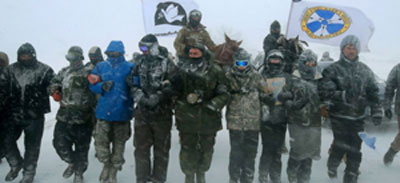 Rory Fanning: There is a lot of leverage in conversations when you are a veteran as to what is and is not necessarily good for society. I think the whole response, Veterans for Kaepernick (the African American football quarterback who refused to stand for the national anthem at a time police were killing unarmed black youth) you saw that trending on Twitter. I think veterans are very sensitive to the fact that this largely is not a free country. There are more people in prison than any other country in the world per capita. The majority of [them are] Black and Latino.
Rory Fanning: There is a lot of leverage in conversations when you are a veteran as to what is and is not necessarily good for society. I think the whole response, Veterans for Kaepernick (the African American football quarterback who refused to stand for the national anthem at a time police were killing unarmed black youth) you saw that trending on Twitter. I think veterans are very sensitive to the fact that this largely is not a free country. There are more people in prison than any other country in the world per capita. The majority of [them are] Black and Latino.
When you sign up, allegedly, to fight for freedom and democracy and you see nothing of that kind being practiced here in the U.S., with the mass surveillance and the reach of agencies like the National Security Agency, etc., this is not what you put your life on the line for. When I see someone like Colin Kaepernick refusing to stand for the national anthem, I think people who have actually sacrificed for freedom and democracy really respond well to that.
One of the reasons I was sensitive to what was happening to Colin Kaepernick, because people were saying that Colin Kaepernick was spoiled and he did not appreciate what he was given and he was a coward for not respecting the flag. I found his case to be the complete opposite of that, which I realized by working with Craig Hodges, who was blackballed by the NBA for demanding the league do more to fight racism, economic inequality. Not just the NBA, but also the president of the United States when he visited George Bush, Sr., after his second championship. He called on power, essentially, to do more to fight these problems in our society and he lost everything as a result.
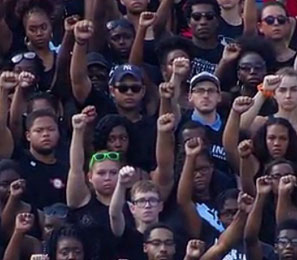
![]()

University of North Carolina students raise fists during the anthem, joining Kaepernick in opposing government racism and police racist killings (left); Fans support Kaepernick's protest at a nationally televised Monday Night football game between the Rams and 49ers.
I saw Colin Kaepernick subject himself to the same fate, potentially. We are seeing NFL owners turn their back on Kaepernick now as he is out in the market trying to get acquired by a team. A lot of what is happening to Kaepernick happened to Craig Hodges. He lost, potentially, millions of dollars standing up for justice. But, he also recognized that he had a platform that could be heard. He realized that the people in his community were not going to have the opportunity to have a microphone, or the New York Times interview you, or visit the White House, so he wanted to make the most out of it because he felt like he owed, not just his community, but also his ancestors who came to this country as slaves and were subject to exploitation and oppression for the last couple hundred years.
One thing that Craig and Colin Kaepernick have in common is they both understand history very well and they are connected to history. Craig, because he was so interested in the history of his people, recognized injustice when he saw it.
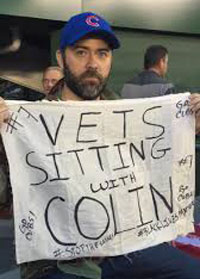 You were one of the people, the veterans sitting with Kaepernick at the Cubs game, right? For people who are reading this who are veterans, do you have advice for them on how to use that moral authority?
You were one of the people, the veterans sitting with Kaepernick at the Cubs game, right? For people who are reading this who are veterans, do you have advice for them on how to use that moral authority?
Yes, I think the best advice is to find a group or an organization. Even if you are a veteran, it is way easier to stand up against something if you have a lot of people with you. I am a member of Veterans for Peace. Iraq Veterans Against the War exists. But, all of these groups need to be strengthened. We are at a lull in the anti-war movement, despite the fact that we are engaged in wars in seven countries right now.
I am constantly looking to talk to more high schools and colleges, wanting to give these kids the full story, because if [military recruiting] is already predatory, it is just going to be on steroids with this administration, the pressures of sending kids overseas to fight wars for billionaires.
We spend about $1 trillion a year on our military; if we took just a percentage of that, we would have completely new infrastructure in this country. This failing infrastructure is a far greater threat than any terrorism here in the US. I think the odds of you dying in a terrorist attack are one in twenty-five million, but the odds of dying in a car crash in Mississippi are one in two thousand.
If a terrorist attack happened in this country or if we provoked Iran into some kind of war, I think the justification for further crackdowns on minorities in this country would be absolutely suffocating. I think it is important that people stay vigilant, pushing back against militarism as much as they can. We do not want to just respond to this administration. It is important to be as vigilant as possible right now against how this administration would respond to a terrorist attack or they could lead us into another war. If we were to go to war against Iran, I think there would be devastating consequences.
I know the anti-war movement is kind of still at a lull, but if we can connect the huge movements around the Women's March, the Day Without Immigrants, and all of that to anti-imperialist/anti-militarist actions, I think we would be better for it.
[TOP]
Expansion of U.S. Imperialist Aggression
U.S. Begins Ground Invasion of Syria
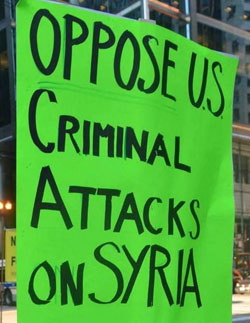 Approximately 300 U.S. marines and 100 Army Rangers entered Syria in early March, according to media reports. They add to the approximately 500 U.S. Special Forces in Syria "training, advising and assisting local forces" and an unknown number of intelligence operatives and mercenaries. The entrance of U.S. ground troops and promise of more is connected to the victories of the Syrian Army in liberating Aleppo and other cities since December and U.S. and Turkish efforts to prevent parts of the north of the country from returning to Syrian control.
Approximately 300 U.S. marines and 100 Army Rangers entered Syria in early March, according to media reports. They add to the approximately 500 U.S. Special Forces in Syria "training, advising and assisting local forces" and an unknown number of intelligence operatives and mercenaries. The entrance of U.S. ground troops and promise of more is connected to the victories of the Syrian Army in liberating Aleppo and other cities since December and U.S. and Turkish efforts to prevent parts of the north of the country from returning to Syrian control.
Marines from the 11th Marine Expeditionary Unit, the Battalion Landing Team 1st Battalion, 4th Marines were located in Navy ships off the coast of Djibouti, then flown to Kuwait and from there to Syria. They brought part of an artillery battery of M777 howitzers. The Army Rangers entered northern Syria from a base used by the U.S. in Erbil, Iraq. Another 1,000 troops could be deployed in northern Syria in the coming weeks according to news reports, bringing the total number to at least 2,000.
The immediate aim of the U.S. is to prevent the liberation of Raqqa by the Syrian Army. Raqqa is the last major ISIS-held city in Syria. Its liberation by Syrian forces would otherwise take place in the coming months. Syrian President Bashar Al-Assad told SANA news on March 18, "We are very close to Raqqa now. Yesterday, our troops reached the Euphrates River, which is very close to Raqqa city, and Raqqa is the stronghold of ISIS today, so it's going to be a priority for us, but that doesn't mean the other cities are not priority. " Assad explained that unless there was stepped up foreign intervention, the war would be over in "a few months."
Instead, the U.S. is deploying troops with an aim to bring Raqqa under siege in the coming weeks. It is joined in this aim by various contending forces, including Turkey, Turkish and U.S.-sponsored armed groups, and a new U.S.-backed coalition called "Syrian Democratic Forces" which is opposed by Turkey. The shifting alliances within the U.S.-backed forces are such that some media disinformation on the U.S. troop deployment states that it has been done to keep all of the warring groups separated and prevent them from turning on each other before Raqqa is taken.
U.S. President Donald Trump, at an event in Melbourne, Florida on February 18 declared his support for the longstanding proposal of Hillary Clinton and other warmongers to establish "safe zones" in northern Syria. "What I want to do is build safe zones in Syria and other places... we were left a mess like you wouldn't believe, but we're going to build safe zones. We're going to have those safe zones. [...] We're going to have the Gulf states pay for those safe zones. [...] We're going to do it that way instead of taking massive numbers [of refugees]." The Trump plan for "safe zones" means U.S. occupation and annexation of sovereign Syrian territory in which U.S. sponsored armed groups are given political power.
This U.S. attempt to snatch victory from the jaws of defeat is desperate. The disputes within the U.S. coalition over who will control what, whether it be proxies of Turkey, groups hoping that, as in the case of Iraq in 2003, U.S. intervention will facilitate their aspirations for independence, or other armed groups under U.S. sponsorship, are further indication that this aggression will not contribute to ending the conflict. It will not resolve any problem for the people of Syria and must be opposed.
Syrian Government Rejects Invasion
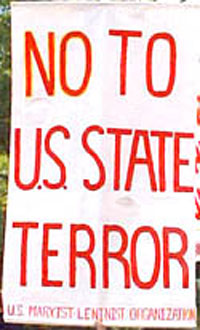 In an interview published on March 20, Syrian President Al-Assad responded to a question about the U.S. presence, saying, "Any military operation in Syria without the approval of the Syrian government is illegal, and I said if there are any troops on Syrian soil, this is an invasion, whether to liberate al-Raqqa or any other place. This is first. Second, we all know that the [U.S.] coalition has never been serious about fighting ISIS or the terrorists, so we have to think about the real intention of the whole plan, if there is a plan to liberate al-Raqqa. To liberate it from who? From ISIS? To give it to who? So, their plan is not to fight terrorists, not to help the Syrian government, it is not for the unity of Syria, it is not for the sovereignty of Syria, it must be something else, not any of these factors that I just mentioned."
In an interview published on March 20, Syrian President Al-Assad responded to a question about the U.S. presence, saying, "Any military operation in Syria without the approval of the Syrian government is illegal, and I said if there are any troops on Syrian soil, this is an invasion, whether to liberate al-Raqqa or any other place. This is first. Second, we all know that the [U.S.] coalition has never been serious about fighting ISIS or the terrorists, so we have to think about the real intention of the whole plan, if there is a plan to liberate al-Raqqa. To liberate it from who? From ISIS? To give it to who? So, their plan is not to fight terrorists, not to help the Syrian government, it is not for the unity of Syria, it is not for the sovereignty of Syria, it must be something else, not any of these factors that I just mentioned."
Asked about double standards of the U.S., which is facing increasing accusations of killing civilians in air strikes in Syria, President Al-Assad said, "The American policy is based on many standards, not double [standards]; they have maybe ten standards because they do not base their policy on values or on international law; they base it on their own vision, their own interests, sometimes on the balance of different lobbies and powers within the American institutions."
Dispute Between U.S. Allies
Meanwhile, Turkish President Recep Tayyip Erdogan, addressing what factions will control Raqqa and how, said on March 2 that the U.S. does not have a "clear plan regarding Raqqa." "During the visits to Turkey of the head of the US Joint Staff and the director of the CIA, steps, which we can call preliminary, have been taken in this process," Erdogan said. It is "unacceptable" that the "Syrian Democratic Forces" should participate in the operation due to the predominance of Kurdish forces in that grouping, he said. In fact, Turkey is leading its own intervention in northern Syria, taking towns such as Jarablus and giving control to its proxy terrorist groups called the "Free Syrian Army."
In response, the U.S. has said it is providing weapons only to "Arab groups" within the "Syrian Democratic Forces" and not the Kurdish YPG, and that more than half of the "Arab groups" have now been "vetted." U.S. General Joseph Votel, head of U.S. Central Command, confirmed the new U.S. troop deployment on March 9 and stated, "Our intention here with this — and this fell within the authorities that are provided to me right now — was to ensure that we had redundant capable fighter support on the ground to support our partners and ensure that we could take advantage of opportunities and ensure the continuing progress that we've been seeing."
Turkey is also concerned about control over a northern Syrian town, Manbij which was taken from ISIS by the Syrian Democratic Forces (SDF) in August 2016. As a result, Turkey's stated plan to create a "safe zone" under its control from its border with Syria to Raqqa is therefore in conflict with the U.S.-backed SDF controlling Manbij. Turkish commentators blamed the situation on "U.S. ambiguity and Russian aggression." On March 16, Turkish Defense Minister Fikri Isik said that a diplomatic settlement of the Manbij issue between Turkey, Russia and the United States is central for the Syria peace process, but that Turkey will resort to other means if this fails.
Bring All U.S. Troops Home Now
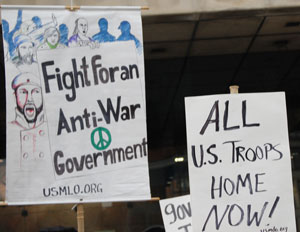 The U.S. has no place in Syria and its newest attempts to derail a peace process and achieve regime change in its favor by continuing to prop up terrorist groups are bound to increase the suffering of the Syrian people and also bound to fail in the face of Syrian resistance. The U.S. has no right to decide over any matter facing the Syrian people, not least control over its territory or airspace.
The U.S. has no place in Syria and its newest attempts to derail a peace process and achieve regime change in its favor by continuing to prop up terrorist groups are bound to increase the suffering of the Syrian people and also bound to fail in the face of Syrian resistance. The U.S. has no right to decide over any matter facing the Syrian people, not least control over its territory or airspace.
The people of the U.S. and the world have been told time and time again that U.S. imperialist military intervention is a solution to crises real or imaginary. This is the case now as the people are told that "finally" the U.S. will eliminate its bastard child ISIS. Far from resolving problems, U.S. intervention in Syria since 2011 has brought and will continue to bring untold misery to the people.
This is because the U.S. aim is first and foremost self-serving, to defend and expand its domination based on geopolitical calculations and to defend the place of the U.S. oligopolies and financial oligarchy. This was the U.S. aim in 2011 when it began funding and providing weapons for revolt against the Syrian government that turned into a full-scale war and parts of the country being occupied by terrorist groups. It is the case now with a stepped up U.S. military intervention based on undermining and obstructing the Syrian-led liberation of Syria.
Syria is a sovereign country whose people are now beginning the difficult work of reconstruction and reconciliation, having overcome challenges that looked insurmountable. Among the biggest challenges was and still is the flow of money, arms and fighters from the imperialists into Syria. The fact that the battle is not over was cruelly reiterated to Syrians on March 15 when a suicide bomb attack took the lives of 32 people in the capital, Damascus. There is an urgent need for all people of conscience to join with the Syrian people in denouncing this U.S. invasion and demanding All U.S. troops OUT!
[TOP]
